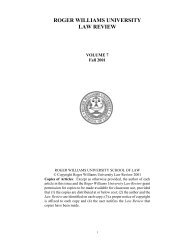AMICUS Vol. 2, No. 1 (Spring 2003) - Roger Williams University ...
AMICUS Vol. 2, No. 1 (Spring 2003) - Roger Williams University ...
AMICUS Vol. 2, No. 1 (Spring 2003) - Roger Williams University ...
You also want an ePaper? Increase the reach of your titles
YUMPU automatically turns print PDFs into web optimized ePapers that Google loves.
The<br />
Big<br />
Q<br />
I am from South Dakota and despite<br />
attending law school on the east coast,<br />
it was always my plan to return to<br />
South Dakota upon graduation to practice<br />
Indian Law. Since I chose to practice<br />
Indian Law, instead of a more traditional<br />
practice area, I always knew my job search<br />
would be challenging; both financially<br />
and geographically. I just never realized<br />
how much debt I would incur during law<br />
school and how that debt would continue<br />
to impact my quality of life.<br />
During my three years at <strong>Roger</strong> <strong>Williams</strong><br />
<strong>University</strong> School of Law, I exhausted<br />
federal loan options and had to obtain<br />
secondary loans at a significantly higher<br />
interest rate in order to meet my living<br />
and academic expenses. Aside from tuition<br />
and books, I also had to pay rent, buy<br />
groceries, and pay for incidentals, like<br />
doctor visits and mechanics.<br />
For many law school graduates, the question is not what type of<br />
law do you want to practice, but rather what type of law do you<br />
want to practice that will enable you to re-pay student loans.<br />
Debt can be prohibitive. Consequently, law school debt can<br />
deter some attorneys from choosing a less profitable public law<br />
career. Amicus reached out to two graduates and asked them:<br />
“What impact would a loan forgiveness program<br />
have on your career choice, or on your present<br />
circumstances/lifestyle”<br />
I am now working for Dakota Plains<br />
Legal Services in Rapid City, South Dakota.<br />
I am paid through their Public Advocacy<br />
Project, which in reality is a conflicts<br />
contract from Pennington County for<br />
public defender’s appointments (we<br />
represent the co-defendants or conflicts<br />
from the public defender’s office). My<br />
present salary is $34,156. and there is no<br />
loan repayment assistance option. I have<br />
a fairly good benefit package, but I do<br />
not have access to a retirement plan. We<br />
are an Indian program so we receive some<br />
funding from Congress, but our budget<br />
will be cut by quite a bit over the next<br />
two years.<br />
Even in South Dakota, a salary of $34,156.<br />
spreads pretty thin. I still pay rent, and day<br />
to day living expenses. <strong>No</strong>tably, one entire<br />
paycheck goes towards my gas bill and my<br />
student loans. There is no available<br />
housing in Pine Ridge so I am commuting<br />
64 miles to and from work, five days a<br />
week. Despite spreading my loan repayment<br />
over as many years as possible, I still am<br />
living paycheck to paycheck.<br />
I chose to practice Indian Law and I would<br />
do it again. When I graduated law school<br />
in 2001, however, the pickings were slim<br />
everywhere and especially here in South<br />
Dakota. I am lucky to have the job that I<br />
do. A loan repayment assistance program<br />
would allow me to pay down my student<br />
debt more rapidly; it would allow me to<br />
buy groceries, buy work clothes, and maybe<br />
to have a bit left over to enjoy some of<br />
the things life has to offer.<br />
Jenn Coleman, ‘01<br />
AT ISSUE…<br />
As I began my job search, I was drawn to<br />
many public service positions, as helping<br />
people in need within society has always<br />
been my avocation. I considered work with<br />
women and children, advocacy positions,<br />
and continuing the work I began with the<br />
law school’s Disability Law Clinic. However,<br />
because of my very considerable student<br />
loan debt it became readily apparent that<br />
if I took any of these positions I would not<br />
be able to meet my student loan payments.<br />
I did take a quasi-public service position<br />
as a national field representative assistant<br />
counsel for National Treasury Employee’s<br />
Union, a not-for-profit organization<br />
representing federal government employees.<br />
My entry pay was set at the federal service<br />
pay for a GS-11 in Washington, D.C. But<br />
even with this excellent entry wage, I find<br />
over 40 percent of my take home salary<br />
going toward my student loans. My<br />
student loan repayment schedules currently<br />
extend well into the next 10 to 15 years.<br />
All of my current and future employment<br />
choices will be driven, and in fact limited,<br />
by my student loan obligations. Many of<br />
my friends and colleagues, like me, wanted<br />
to take public service positions, but could<br />
not do so because the salaries in public<br />
service positions would not allow them to<br />
support themselves and families in addition<br />
to meeting their student loan obligations.<br />
The introduction and passage of a student<br />
loan forgiveness program for those attorneys<br />
who enter into public service would free<br />
our best and brightest attorneys to fulfill<br />
their avocations and allow them the<br />
opportunity to support themselves and<br />
their families.<br />
Wendy Lucas-Pisman, ‘01<br />
9

















